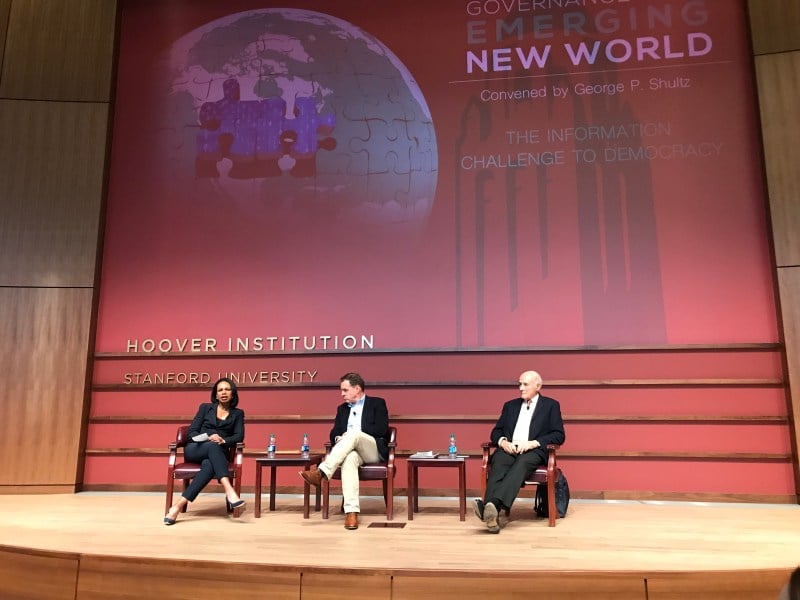On Tuesday, the Hoover Institution held a panel discussion on the challenges that technological change and the communications revolution pose to democracies. Moderated by former U.S. Secretary of State and Hoover senior fellow Condoleezza Rice, the panel was the third in Hoover’s “Governance in an Emerging New World” series, led by former Secretary of State George P. Shultz.
Harvard professor and former Kennedy School of Government dean Joseph Nye spoke on the panel with Hoover senior fellow Niall Ferguson, who faced controversy in spring over his own online communications. Specifically, leaked emails in May revealed Ferguson’s collaboration with the Stanford College Republicans (SCR) to conduct “opposition research” on a student.
The panelists began by addressing the vulnerabilities of democracy in the age of information warfare. Ferguson discussed the rise of technology in the early 2000s and said that the weaponization of information could be detrimental to democracies if not properly managed.
“The public sphere in the United States dramatically changed in its structure in less than a decade,” Ferguson said. “[There is a] real failure of domestic regulation to manage this transformation and to create an economic protection for the democratic system.”
Nye added that, while foreign powers could exploit the existing divisions in society through information warfare, the root of the problem should be attributed to cultural changes.
The panelists also warned against the “echo chamber” effect, the phenomenon where people tend to seek out or be presented with information that only reinforces their own beliefs or views.
“Network platforms, as presently constituted, are engines not just of confirmation bias … but [they] are accentuating divisions in our society in a way that is profoundly dangerous,” Ferguson said.
The panelists also discussed authoritarian regimes’ responses to the information challenge. According to Nye, while authoritarian regimes like China and Russia may use “network sovereignty” – claims to exert control over certain network and cyberspace boundaries – to justify censorship and provide Internet stability in the short run, the centralization of information in this way would prove unsustainable in the long run.
“If something unpredicted occurs, it’s not clear that the system that they’ve developed in China is going to be properly adapted,” Nye said. “Right now they have a tactical advantage, but I’m reluctant to say that authoritarians have the answer.”
Ferguson added that heavy use of surveillance technology by the Chinese government exposes the authoritarian regime’s sense of vulnerability.
“This is a regime that spends more on domestic security than on national security,” Ferguson said. “You don’t do that if you don’t to some level fear about some people.”
When asked for suggestions on what the road ahead should be for democracies, both panelists called for corporations to take on more social responsibility and for governments to collaborate on ways to better safeguard the cyberspace.
Stone Yang ’22 and Stanford Medical School visiting researcher Sophie Neuenfeldt said Tuesday’s event was thought-provoking.
“As someone [who is] not from the political academic world, I was impressed by Ferguson’s idea that every topic should be discussed and everyone should be open to discussion,” Neuenfeldt said.
“I think [the panelists] expanded and dug deep into the issues, such as international norm-building, that I have been debating myself,” Yang added.
The fourth event in the series – which will focus on economic development and public transparency in Latin America – will be held on Dec. 3 in the Hauck Auditorium of the Hoover Institution’s David & Joan Traitel Building.
The article has been edited to show that the Dec. 3 event on Latin America will not be the last in the series – the series will continue in Winter Quarter. The Daily regrets this error.
Elena Shao contributed to this report.
Contact Daniel Yang at danieljy ‘at’ stanford.edu.
